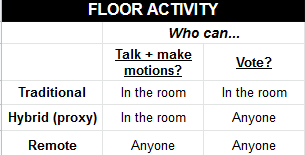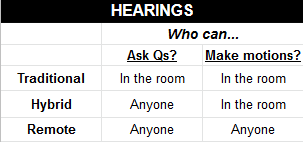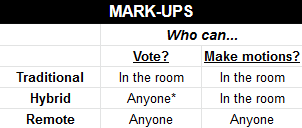Will the House come back this week? Will Congress turn on remote deliberations? Is it really 142 days from the end of the fiscal year? There are lots of good questions (et tu, Senate) that we address this week. If we’ve missed something, ask us on Wednesday at 5pm at this virtual panel discussion on Continuity of Congress.
TOP LINE
Hybrid hearings, virtual proceedings, and mock floor debates are just some of the big remote Congress developments last week. We cover it all in the Continuity of Congress sections below, and don’t forget we have more resources at continuityofcongress.org, including a timeline on remote deliberations and voting.
Insecurity. The Senate voted 49-44 to overturn the presidential veto of a War Powers resolution concerning Iran — failing to meet the necessary 2/3s threshold. The use of war powers resolutions have become more common but likely will remain unsuccessful until the presumption is flipped and wars can only continue with congressional approval. It’s the kind of thing a savvy legislator might attach to a must-pass bill.
Some Senators conflate being in DC with being at work, but as former Rep. Israel wrote in the NYT, “there’s something even more sacred than meeting face-to-face — and that’s the commitment to keep the American public safe.” Congress has viable options to work remotely, and returning to DC needlessly puts people in danger; just look at the 14 Capitol Police officers and 11 Capitol construction workers who tested positive for Coronavirus. Some Members are mitigating risk by staying away from DC, or staying put to avoid bringing the virus home.
• We note that Google and Facebook have announced staff can work from home until next year, and other companies have already announced telework through the fall, and some are moving to permanent telecommuting. Forcing people to come back to work right now is unsafe, logistically difficult (especially for those with kids), and businesses need time to reconfigure their offices for safety. It’s important for people to be able to plan ahead.
• Sen. Lamar Alexander will self-quarantine in Tennessee after a staffer tested positive for COVID-19. GovTrack is keeping track. This will keep happening so long as Members meet in person.
Counterintuitively, remote work may be helping Members connect. Sens. Portman and Cornyn have told the press that, because remote work eliminates distractions like constant traveling and rushing off to events, they are better able to connect with fellow Members and constituents. Angus King instagrammed “I have never worked harder or been in touch with as many Maine people than during the past weeks working from home.” And Rep. Tom Graves said “There seems to be an easier ability to connect and get information,” attributing that benefit to technology.
Challenging oversight authority. The president openly admitted he won’t let Dr. Fauci testify before the House because “the House is a bunch of Trump haters.” Fortunately, former CRS attorney Mort Rosenberg wrote the book on vindicating Congress’s oversight authority.
Money. House Democratic Leadership and its top Appropriators have determined how much money will be available to each of its appropriations subcommittees — known as the 302(b)s — but they aren’t telling the public what those top lines numbers are. (The Senate isn’t either, but the House goes first on approps and the Senate hasn’t finalized their numbers.) Meanwhile, the CARES 2.0 bill may get a House vote this week, but the text isn’t publicly available and committees aren’t holding official meetings. There are also hints that the OCO — an off-book ”emergency” ~$300B war-related slush fund that amounts to almost 10% of discretionary spending — may be replicated, with the creation of another off-books fund to help with Coronavirus response.
Intern Pay. New regulations from the House Admin Committee now permit offices to pay district office interns and provide equipment for remote work during the pandemic. Each office has an allowance of $25,000 per calendar year.
ON YOUR RADAR
The Senate is expected to vote on domestic surveillance this week. Senator McConnell has given notice that a vote on reauthorizing Section 215 of the PATRIOT Act is scheduled, along with votes on three pro-civil liberties amendments and three others. The bill was rammed through the House in March, amid major opposition, after Speaker Pelosi pulled the bill out of the Judiciary Committee when it became clear that pro civil-liberties amendments would be offered (and would likely be adopted) to improve the troubled programs. Oddly, the bill’s co-sponsors testified before the House Rules Committee that they wished the bill was better on civil liberties, but that their hands were tied. One wonders by whom. Learn more at Section215.org.
ICYMI:
• Congress is reclaiming its power of the purse with a recently introduced bill, the Congressional Power of the Purse Act (H.R.6628). Here are the details.
• Remote deliberations are constitutional. A staff report from HSGAC’s Permanent Subcommittee on Investigations released on April 30 answers the constitutional questions around remote deliberations & voting. This has major implications for remote deliberations & voting. More below.
Please help us. We are reading the rules from every single committee to examine how their rules vary on questions like how many members do you need to hear testimony, issue a subpoena, change the committee rules, etc. Our first cut is here — what have we missed or gotten wrong? Tell us at [email protected].
CONTINUITY OF CONGRESS: REMOTE DELIBERATIONS
Can committees go hybrid without rules changes? Committees’ rules on quorum are buried in a 400 page compilation of House Rules and 322 page compilation for the Senate. Our team is parsing out the requirements for different actions, such as holding a hearing versus issuing subpoenas, but it’s slow going. It’s clear that many committee rules have not been well maintained.
What to call all this stuff? We’ve been throwing around terms that are ill-defined and used inconsistently: remote hearings, virtual hearings, remote voting, etc. It’s probably time to define this a bit better. Below are some initial thoughts.
• A “traditional” proceeding is how the House and Senate currently do things, both in terms of rules and common practice.
• A “hybrid” proceeding is one where a quorum is physically present in the committee room/on the floor but additional members are participating from elsewhere. I think we saw remote hearings last week in the Senate.
• A “remote” proceeding is one where a quorum is only present if you count participating members not present in the hearing room/on the floor. These would come into existence when the House or Senate change their rules. If no one is physically present, it could be called “fully remote.”
• A “virtual” proceeding is a proceeding that is not official because of a lack of quorum in a room in DC, but otherwise has sufficient members participating and follows all other committee/ chamber rules.
• A “round table” is not intended to simulate an official proceeding, but in the absence of hybrid or remote proceedings, it is intended to do committee work and later be adopted by in an official proceeding.
Have a better idea? Email us at [email protected].
House committees and caucuses have been piloting virtual hearings with quite a bit of success. Marci Harris’s blogpost has the best round-up we’ve seen, with useful recommendations for those who want to get their feet wet. Proceedings last week included the Fix Congress committee talking to experts about best practices for remote committee and Member operations (watch here) and Majority Leader Hoyer convening his weekly meeting with Committee Chairs over video conference as he continues to advocate for video deliberations.
Senate committees held “hybrid” hearings last week, with some members participating remotely even while a majority were physically present. Committees that met this way included Banking, Judiciary, HSGAC, and Rules. One interesting wrinkle: is the majority counting the votes of members that participate remotely? Senate Rules did not, although we couldn’t find a reason why. Presumably the committee’s proxy voting requirements should push in favor of including votes (so long as quorum has been satisfied).
A fully remote hearing — no votes — could be next in the Senate: the leaders of the Senate Rules Committee, Sens. Blunt and Klobuchar, indicated they are interested in implementing remote hearings through remarks at last week’s Rules hearing. Plus, there’s a completely virtual hearing on the schedule this week in the Banking Committee. (Interesting, no?)
What’s next in the House? It depends on whether they come back this week, whether they amend their rules, and what provisions they adopt. If it’s anything like the draft resolution from a few weeks back, it would be fully remote deliberations in committees and proxy voting on the floor.
Support agencies and officers need to be considered, too. For example, the House Democracy Partnership is going virtual.
CONTINUITY OF CONGRESS: REMOTE VOTING
Congress has been going back and forth on remote deliberations & voting. It’s hard to keep track of where everything stands, so we built a continuously updating timeline to make it easier. (Did we miss something? Email [email protected])
What’s at stake if Congress doesn’t act soon on remote voting? Congress has ceded its power to the White House. Proposals from the Republican Members of the bipartisan task force to reopen the House fell short, said Democrats on the task force, and us too. We agree that taking a step-by-step approach makes sense, but the more than two-months of delay indicates we need to speed up the process of moving to remote deliberations.
Virtual voting on the horizon? The Problem Solvers Caucus held the first (mock) virtual floor proceedings, a “floor debate,” last week.
Speaker Pelosi is still pushing proxy voting in the House, which would allow Members in DC to vote on behalf of other Members who are not present. While we are pleased that the Speaker has finally embraced some form of remote deliberations, proxy voting is the least-good choice: it cuts rank and file Members out of the decision-making process, aggregating more power to leadership.
BTW changing voting rules wouldn’t actually break 200 years of tradition. House floor rules have been changed many times, including in the 19th century to avoid counting members that were dead, in rebellion, or refused to vote; they changed again in the 1970’s rules to allow electronic voting on the floor; and recently to require 72-hours notice on what’s being voted on.
Where does the Senate stand on remote voting? No seriously, we’re asking. There have been some great proposals, but is leadership going to let any proposal move forward? And on that point — why is the Senate still making members drop off legislation in person? The House set up digital submissions weeks ago.
CONTINUITY OF CONGRESS: LEARNING FROM OUR NEIGHBORS
Legislatures around the world are adapting to continue business during the pandemic. In the UK, the 700 year old parliament voted via video conferencing (read their procedures). The Argentinian legislature has held virtual committee hearings on Zoom and the lower house approved a protocol to trial run a mix of in-person and remote participation in plenary sessions.
There are a bunch of resources on lessons learned from other governments. For example, the Commonwealth Parliamentary Association hosted virtual panel discussions for Clerks and parliamentary staff to share best practices on delivery of parliamentary democracy during the pandemic.
Hey Congress, check out the business continuity management (BCM) guide for legislatures from LABCoN (the Legislative Assemblies Business Continuity Network) to help mitigate disasters. LABCoN is a working group composed of staff from legislative assemblies with a professional interest and expertise in business continuity. (The U.S. is not yet a member.)
LET CONGRESS BE CONGRESS: OVERSIGHT POWERS
Advice and Consent. There were several nomination hearings with the Senate’s return last week, including a Judiciary committee hearing for Sen. McConnell’s protégé, a Banking Committee hearing for the new Special IG, and a Rules Committee hearing for a controversial FEC nominee. Republican Chairs and senior senators “have concerns about nominees’ qualifications and are frustrated by the administration’s resistance to respond to queries about the nominees’ records.” ($)
A federal court told the DOJ to give Congress redacted grand jury materials from the Mueller probe, but now SCOTUS has granted the president’s request to temporarily block the order.
Meanwhile, the House and the Trump Administration both urged SCOTUS to take up the question of whether banks must provide information in response to a House subpoena for Trump’s financial information.
The president has been attacking watchdogs for weeks; 9 former Inspectors General responded to the crisis in a letter to Congress suggesting reforms and new collaboration on oversight.
COVID OVERSIGHT
Minority leader McCarthy appointed Reps. Jim Jordan, Blaine Luetkemeyer, Mark Green and Jackie Walorski to the Select Subcommittee on the Coronavirus Crisis, and named Minority Whip Scalise as Ranking Member.
The Congressional Oversight Commission still has no chair but Republican former FDIC chair Sheila Bair has been floated as a potential nominee, and has the support of several oversight groups.
The Senate Banking Committee held a nomination hearing for Brian Miller to serve as the Special Inspector General For Pandemic Recovery.
APPROPS
FY 2021 starts in 142 days, will Congress have spending bills done in time? ($). The defense/non-defense numbers, known as 302(a) allocations, were set last year. The House decided on 302(b) allocations last month ($), which govern how much money each appropriations subcommittee gets; the numbers are not publicly available. It would not be unreasonable for them to have changed significantly from last year, given all that’s happened.
Spending bill drafts were due last week for several House appropriations subcommittees ($). Majority Leader Hoyer says he expects the House to consider 2021 spending bills next month. Senate Republicans met to discuss allocations and markups, but the Chamber got off to a late start and being unable to hold hearings for two months doesn’t help.
Check out our team’s testimony for the Senate Leg Branch subcommittee on creating a Legislative Branch InformationTechnology Coordination Office and getting staffers necessary security clearances, plus our House testimony on access to congressionally-mandated reports and Capitol police data.
TRANSPARENCY
96 secret Office of Legal Counsel (OLC) opinions from the Nixon-Era were obtained and published by the Knight Institute as part of an ongoing lawsuit to promote public access to OLC opinions. All these opinions should have already been made publicly available — and we agree that it’s time for an accounting of currently existing OLC opinions, as described in H.R. 4556.
A bipartisan group of Senators are pressing FOIA officers for details of how agencies will continue to comply with the public records law during the pandemic.
The Supreme Court held its first livestream last week; Sen. Grassley is saying yes, more please. Transparency advocates (full disclosure: including us) have long called for audio/visual livestreamed SCOTUS arguments.
ETHICS
Roll Call covers how the ethics process was handled in the early 90’s before the Congressional Accountability Act was enacted (and superseded by the Office of Congressional Workplace Rights).
Sen. Loeffler received a parting gift worth $9 million from her former employer the Intercontinental Exchange (parent company to the NY stock exchange), NYT reports. Sen. Loeffler has already come under scrutiny for her financial dealings, and is now removing herself from a Senate Agriculture subcommittee on commodities, risk management and trade to minimize the appearance of conflicts of interest.
Sen. Burr, who continues to sit on the Select Intelligence Committee as he is investigated for potential insider trading, may have tipped off his brother in law who ProPublica found dumped stocks the same day as Sen. Burr. Still no word on whether Sen. McConnell will have him temporarily step down from SSCI.
Rep. Speier asked the AOC and the House Physician to ban “unethical practices” that put Capitol support staff at risk, including stopping Members from sleeping in their offices.
ODDS & ENDS
Capitol Police officers are testing positive for Coronavirus, although it’s impossible to know how many officers have been exposed or infected. As a reminder back in March Capitol Police Management suspended certain labor protections for officers and did not comply with union requests for testing.
The Capitol Police department chose not to post a press release circulated last week, but they did post the weekly arrest summary which detailed three arrests (all traffic related). Does anyone know why the department only posts a handful of its press releases annually?
EVENTS
The House hearing schedule is here (only one hearing is scheduled) and the Senate hearing schedule is here (only a few proceedings are scheduled).
Tuesday
• OGIS is hosting a “FOIA Requests for CDC COVID-19 Records“ webinar from 11 to 1. CDC’s FOIA leadership will provide insight into the agency’s FOIA program and suggest strategies for successful FOIA requests; you can register here.
Wednesday
• Senate Homeland Security and Governmental Affairs Committee is holding a video conference hearing to “Examine Evolving the United States Cybersecurity Strategy and Posture, Focusing on Reviewing the Cyberspace Solarium Commission Report” at 9:30 am.


